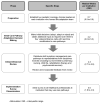Symptom management care pathway adaptation process and specific adaptation decisions
- PMID: 37069510
- PMCID: PMC10108500
- DOI: 10.1186/s12885-023-10835-0
Symptom management care pathway adaptation process and specific adaptation decisions
Abstract
Background: There is substantial heterogeneity in symptom management provided to pediatric patients with cancer. The primary objective was to describe the adaptation process and specific adaptation decisions related to symptom management care pathways based on clinical practice guidelines. The secondary objective evaluated if institutional factors were associated with adaptation decisions.
Methods: Fourteen previously developed symptom management care pathway templates were reviewed by an institutional adaptation team composed of two clinicians at each of 10 institutions. They worked through each statement for all care pathway templates sequentially. The institutional adaptation team made the decision to adopt, adapt or reject each statement, resulting in institution-specific symptom management care pathway drafts. Institutional adaption teams distributed the 14 care pathway drafts to their respective teams; their feedback led to care pathway modifications.
Results: Initial care pathway adaptation decision making was completed over a median of 4.2 (interquartile range 2.0-5.3) weeks per institution. Across all institutions and among 1350 statements, 551 (40.8%) were adopted, 657 (48.7%) were adapted, 86 (6.4%) were rejected and 56 (4.1%) were no longer applicable because of a previous decision. Most commonly, the reason for rejection was not agreeing with the statement (70/86, 81.4%). Institutional-level factors were not significantly associated with statement rejection.
Conclusions: Acceptability of the 14 care pathways was evident by most statements being adopted or adapted. The adaptation process was accomplished over a relatively short timeframe. Future work should focus on evaluation of care pathway compliance and determination of the impact of care pathway-consistent care on patient outcomes.
Trial registration: clinicaltrials.gov, NCT04614662. Registered 04/11/2020, https://clinicaltrials.gov/ct2/show/NCT04614662?term=NCT04614662&draw=2&rank=1 .
Keywords: Care pathway; Clinical practice guidelines; Implementation; Oncology; Pediatric; Supportive care; Symptom management.
© 2023. The Author(s).
Conflict of interest statement
The authors declare that they have no competing interests.
Figures
References
-
- Institute of Medicine (US) Committee on Standards for Developing Trustworthy Clinical Practice Guideline. Clinical Practice Guidelines We Can Trust Washington (DC): National Academies Press (US); [Available from: https://www.ncbi.nlm.nih.gov/books/NBK209539/
Publication types
MeSH terms
Associated data
Grants and funding
LinkOut - more resources
Full Text Sources
Medical


